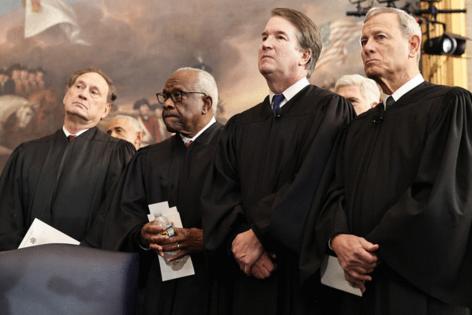Noah Feldman: The age verification fallout on free speech is starting
Published in Op Eds
The Supreme Court is asleep at the wheel when it comes to protecting free speech. The latest sign is the decision by the social media app Bluesky to block its service in Mississippi because the decentralized, public benefit corporation can’t afford to require age verification for all its users as required by a clearly unconstitutional state law.
Here’s why it’s the court’s fault. Earlier in August, a coalition of social media platforms known as NetChoice asked the Supreme Court for emergency relief to block the Mississippi law. The justices refused. Maybe some of them believed the law was constitutional, relying on their mistaken decision in June’s Free Speech Coalition v. Paxton, which upheld an age-verification law in Texas. Or maybe they agreed with Justice Brett Kavanaugh, who noted in a solo concurrence that the platforms hadn’t shown that the situation was dire enough to merit emergency intervention. But it clearly was — or else Bluesky wouldn’t have been forced to block Mississippi users.
Silencing a platform dedicated to political discussion is a textbook example of an urgent, emergency scenario that requires the Supreme Court to intervene and strike down an unconstitutional state law.
At a minimum, the justices are at fault for not taking seriously the dire consequences of the Mississippi law, which requires virtually all digital service providers to obtain age verification from all users under threat of prohibitively high fines. Seen more broadly, the six conservative justices are also at fault for June’s Paxton decision, in which they upheld age verification laws for accessing online pornography and rejected the precedent-based argument that such laws would chill First Amendment rights for adult users.
To understand the full context here, you need to understand that many states have been trying to prevent minors from accessing all kinds of social media content by imposing similar age verification requirements. In the last year alone, federal district courts blocked such laws in Georgia, Florida, Ohio, Arkansas, North Dakota, Texas and Utah. The basic reason for these rulings is that they not only restrict minors’ free-speech rights, but also chill adult speech by requiring platform users to provide personal information to verify their age.
The Paxton decision involved a Texas law that required age verification for accessing pornography sites, not general social media platforms. But in the course of the poorly reasoned decision, Justice Clarence Thomas insisted that the law did not directly burden speech but merely imposed an “incidental” burden on accessing protected speech by requiring adults to verify their ages. As Justice Elena Kagan explained in her dissent, that analysis is just plain wrong as a matter of doctrine. Requiring age verification to access constitutionally protected material is a direct — not incidental — burden, on accessing that material.
Now, turn to the Mississippi law. A federal district court in the state blocked the statute from going into effect, just as district court judges in other states had done. But, after the Supreme Court’s Paxton decision came down, the hyper-conservative US Court of Appeals for the Fifth Circuit reversed the lower court’s decision. The Fifth Circuit offered no explanation. But it’s plausible to think that the court believed Mississippi’s age verification requirement could be considered constitutional because, under Paxton, such requirements are viewed only as incidental burdens.
NetChoice petitioned the Supreme Court, seeking an emergency order to restore the block. The court declined. The only explanation came from Kavanaugh, who wrote that although he believed the Mississippi law was likely unconstitutional, NetChoice hadn’t shown that “the balance of harms and equities” justified emergency relief.
The only even slightly good thing about this decision was that Kavanaugh is clearly correct that the Mississippi law is unconstitutional. But the Paxton decision went 6-3 in favor of the state, with all six conservatives upholding the law and all three liberals voting to strike it down. Kavanaugh alone isn’t enough — at least one other conservative would need to flip.
Worse, the Bluesky decision demonstrates the flaw in Kavanaugh’s conclusion about the equities. Bluesky isn’t a porn site. It’s a decentralized platform that resembles Twitter before Elon Musk acquired it, changed how it operates, and renamed it X. Bluesky operates with a small staff and a relatively modest budget compared to major social media platforms. As explained in a post, Bluesky can’t afford to implement age verification.
The upshot is that the Supreme Court is directly responsible for forcing Bluesky to shut down in Mississippi. The best-case scenario is that the court simply underestimated the real-world consequences of the law when it declined to overturn the Fifth Circuit. The worst-case scenario is that a significant number of justices might be willing to follow the bad logic of the Paxton decision — with potentially dire consequences for free speech.
You might think there are bigger problems in the world than the shuttering of one app in a single state. That’s not how the First Amendment works. When the Supreme Court allows core political speech to be silenced by a state for no good reason, the free speech consequences can be significant. Other states are watching. So are the federal courts. Vigilance in favor of free speech is a virtue. The Supreme Court can’t afford to nod off.
_____
This column reflects the personal views of the author and does not necessarily reflect the opinion of the editorial board or Bloomberg LP and its owners.
Noah Feldman is a Bloomberg Opinion columnist. A professor of law at Harvard University, he is author, most recently, of “To Be a Jew Today: A New Guide to God, Israel, and the Jewish People."
_____
©2025 Bloomberg L.P. Visit bloomberg.com/opinion. Distributed by Tribune Content Agency, LLC.
























































Comments